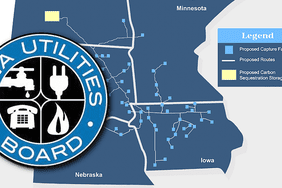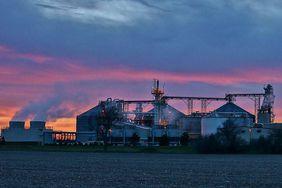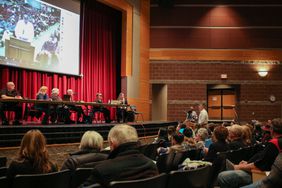:max_bytes(150000):strip_icc()/navigator-c02-logo-social-4b2b91e4d3b94116b0bb786ea63c414c.jpeg)
Navigator C02
Carbon management company Navigator C02 announced the cancellation of its Heartland Greenway pipeline project on Friday, citing the "unpredictable nature of the regulatory and government processes involved" in South Dakota and Iowa.
In a press release, Navigator C02 CEO Matt Vining said, “As good stewards of capital and responsible managers of people, we have made the difficult decision to cancel the Heartland Greenway project. We are disappointed that we will not be able to provide services to our customers and thank them for their continued support.
"I am proud that throughout this endeavor, our team maintained a collaborative, high integrity, and safety-first approach and we thank them for their tireless efforts. We also thank all the individuals, trade associations, labor organizations, landowners, and elected officials who supported us and carbon capture in the Midwest.”
The Omaha-based carbon company had run into multiple roadblocks during its attempt to get approval for a proposed 1,352-mile pipeline running through parts of South Dakota, Nebraska, Iowa, Minnesota, and Illinois. Navigator withdrew its application for approval in Illinois Oct. 10, calling into question what the future plans for the project were.
That decision came after the South Dakota Public Utilities Commission unanimously rejected Navigator's application in September, alleging that Navigator failed to "provide a timely notice to some of the landowners along the proposed route." On Sept. 29, Navigator filed a motion with Iowa's Utilities Board to pause its application in the state.
Industry Reaction
Navigator was one of a handful of carbon capture and sequestration (CCS) pipeline projects in the Midwest. The pipelines are working primarily with ethanol plants. Ethanol proponents have not been shy about how vital CCS is to the long-term success of the industry.
"CCS is the essential key to unlocking the 100-billion-gallon sustainable aviation fuel (SAF) market for agriculture in the long term," says Monte Shaw, executive director of the Iowa Renewable Fuels Association. "If realized, the SAF market would trigger the largest rural economic boom since the introduction of corn hybrids. It is not an overstatement to say that decisions made over the next few months will likely place agriculture on one of two paths: One would lead to 1990s stagnation as corn production exceeds demand, and the other opens new market opportunities larger than anything we’ve ever seen before."
Summit Carbon Solutions is a multi-state CCS pipeline project similar to Navigator. In reaction to today's news, the company expressed steadfast commitment to its project.
"Summit Carbon Solutions welcomes and is well positioned to add additional plants and communities to our project footprint," says a Summit spokesperson. "We remain as committed to our project as the day we announced it. It’s not often you get the opportunity to positively impact an industry that touches every farmer and rural community across the Midwest. We have reached voluntary agreements along nearly 75% of our proposed route – we are pleased that the vast majority of landowners and farmers across the Midwest embrace the project. We look forward to building a generational asset that will create new markets for the ethanol industry and farmers."
Furthermore, Geoff Cooper, CEO of the Renewable Fuels Association, a national ethanol trade association, says a CCS pipeline is not the only option for many plants looking to capture carbon.
"Navigator's decision today does not in any way deter or distract our industry from pursuing ethanol with net-zero emissions by 2050 or sooner," he says. "And our member companies are going to continue pursuing many different technologies, different pathways, for achieving carbon intensity reductions."
Some plants are located on top of or near geography that would allow for on-site CCS. Others, Cooper says, may pursue other ways to capture and utilize the carbon.
Project Opposition
CCS pipelines have been contentiously debated over the past couple of years in the impacted states. Opposition has come from environmental groups and landowners who have raised concerns over eminent domain use, safety, and the validity of the projects. Shaw and Cooper both expressed frustration in the wake of today's news at the influence of environmentalists who are on the record opposing modern agriculture and ethanol as part of a low-carbon future.
"The most frustrating part of this for us is that the same activists who have been saying, 'We have got to keep carbon in the ground and out of the atmosphere,' are the same people who are now doing everything they can to shut down projects that would do just that, and it really makes no sense to us," says Cooper.
As far as landowner opposition is concerned, Shaw highlights what he calls a "super majority" of landowners impacted by Summit's project who have voluntarily signed easements. He and Cooper both assert that in meeting with the pipeline companies all genuine questions and concerns can be addressed.
"We're continuously telling people, policymakers, regulators, and media don't be fooled by the loud voices," Shaw says. "Who is the most educated person on this topic? An impacted landowner who has sat down with the project and talked through what an easement might look like...75% of the landowners [impacted by Summit's project] have had a conversation like that and signed a voluntary easement."
:max_bytes(150000):strip_icc()/D3_6937-2000-cbc088ead7fc464f94999b4660b03bb7.jpg)
:max_bytes(150000):strip_icc()/CassidyWalter_1-web-83717e5b38194dfa9e314356b6d4c1c2.jpg)







